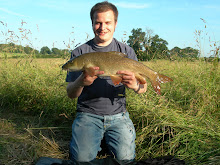IT has recently become apparent that the otter is the latest threat to fish stocks, the livelihoods of people who depend on them as a source of income and the anglers who utilise them for sport.
They are currently decimating stocks of big fish in the way that cormorants have wiped out smaller species from some venues and when you add eastern Europeans into the mix, the picture start to look grim.
Many anglers would love to see the AT back a call for a sensible, well-researched, humanely carried out and ecologically sound otter cull. In fact if it did, the AT would probably receive a much needed boost in membership as a direct result.
On the other hand, to suggest culling what will forever be lodged in the nation's psyche as a “warm and cuddly” animal, as Chris Burt calls the public perception of the otter, would be a public relations disaster and serve only to widen the gap between anglers and some other waterways users and nature enthusiasts or 'antis'.
Regardless of how it occurs, something needs to be done about the otter problem that our sport now faces. More anglers joining the AT would help as it would provide a stronger, more united front with which to confront those who oppose the issue or even deny that a problem exists.
The Environment Agency (EA) needs to acknowledge the severity of the problem more seriously. Angling does not need its sympathy, it needs to see a return on the money that anglers fork out for a license each year to do something to prevent the unchecked rise of the otter.
An EA spokesman quoted in the Times suggests that: “where losses are particularly high, or are likely to be a serious problem, steps should be taken to prevent otters gaining access.”
The £100,000 that the EA has designated for otter-proof fencing is not going to cover the miles of river system yet to be subjected to the otter blight. To even begin to imagine that rivers and large lakes can be protected by expensive fencing is madness for too many reasons to list. It's simply not feasible which brings the argument back round to the need for a cull.
It has been pointed out that the otter's first choice from the piscatorial menu is the eel which is already in very real danger of extinction. This is incredibly worrying and for this reason alone the otter – a creature that belongs in the sea – needs to be kept under control so that we do not see the last of this ancient and mysterious fish disappear down Tarka's neck.
When eels have been wiped out and there aren't enough of the other freshwater species to sustain otter numbers, what will happen to them? Maybe they'll go into decline or be forced back to the sea and the problem will come to an end. But anglers will be left with nothing to fish for and a thriving British industry will be in tatters.
I have no doubt that my opinions on the matter are simplistic and I'm not pretending that they are fact or backed up by solid scientific evidence. Again, this is where I and thousands of other anglers need the AT and the EA to shed some proper light on the issue and take positive steps towards finding a solution, not just meekly pander to the whims of a public who simply don't understand the threat posed by the otter.
The article in the Times states that some unidentified 'experts' claim that coarse fishing could be wiped out in five years. While I don't think that this is currently the case, I'm concerned that it soon could be. To prevent it we must put our collective heads together and come up with a way to beat the cutest of enemies that the sport has ever faced in a way that suits all parties.
Subscribe to:
Post Comments (Atom)

No comments:
Post a Comment